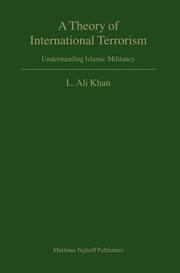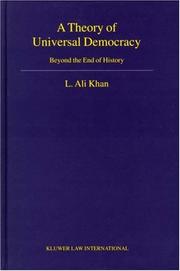| Listing 1 - 5 of 5 |
Sort by
|

ISBN: 9004152075 9789004152076 9789047409991 904740999X 1281399612 9781281399618 9786611399610 6611399615 Year: 2006 Volume: 56 Publisher: Leiden Boston Martinus Nijhoff Publishers43
Abstract | Keywords | Export | Availability | Bookmark
 Loading...
Loading...Choose an application
- Reference Manager
- EndNote
- RefWorks (Direct export to RefWorks)
A Theory of International Terrorism studies Islamic militancy in the geopolitical contexts of Chechnya, Kashmir, Palestine, and the September 11 attacks on the United States. These contexts have shaped a global ontology of Islamic terrorism, which asserts that puritan Islam is inherently violent and Muslim militants are addicted to carnage. This ontology is significantly changing international law. It defends the preemptive war on terror and disregards civil liberties, prescribing extra-judicial killings, torture, renditions, indefinite detentions, and numerous other human rights violations. These normative shifts are considered inevitable to suppress Muslim militants. Questioning these shifts, the book argues that the policy of no negotiations with Muslim militants is contrary to the UN Charter. It also argues that terrorism cannot be eradicated unless the Nation-State evolves into the Free State, a concept developed in The Extinction of Nation-States (1996) and A Theory of Universal Democracy (2003). Universities, governments, and international organizations will find this book a source of valuable information.
Terrorism. --- Islamic fundamentalism. --- Terrorisme --- Intégrisme islamique --- Islamic fundamentalism --- Terrorism --- Acts of terrorism --- Attacks, Terrorist --- Global terrorism --- International terrorism --- Political terrorism --- Terror attacks --- Terrorist acts --- Terrorist attacks --- World terrorism --- Direct action --- Insurgency --- Political crimes and offenses --- Subversive activities --- Political violence --- Terror --- Fundamentalism, Islamic --- Islamism --- Islam --- Religious fundamentalism --- Islam. --- Terrorisme. --- Intégrisme islamique. --- Islamisme. --- Terrorismus --- Actes de violence --- Actes terroristes --- Activités terroristes --- Terrorisme international --- Victimes du terrorisme --- Terroristes --- Attentats --- Radicalisation violente --- Terrorisme et littérature --- Et le terrorisme --- Agression --- Nihilisme --- Piraterie --- Révoltes --- Terreur --- Violence politique --- Écoterrorisme --- Terrorisme maritime --- Commerce international --- Transport --- Cyberterrorisme --- Attentats-suicides --- Bioterrorisme --- Mouvements de libération nationale --- Otages --- Sabotage --- Terrorisme d'État --- Terrorisme nucléaire --- Guerre asymétrique --- Action directe --- Révolutions --- Activités subversives --- Droit international pénal --- Crimes et délits politiques --- Conflits de basse intensité --- Intégrisme islamique --- Islamisme politique --- Islamisme radical --- Islamistes --- Mouvements islamistes --- Islamisme et antisémitisme --- Et l'islamisme --- Terrorisme islamiste --- Djihadistes --- Propagande islamiste --- Idées politiques --- Islam et politique --- Intégrisme --- Fondamentalisme --- Modernisme islamique --- Islamisme --- Fondamentalisme religieux --- Droit --- droit international --- politique --- droit --- Lutte contre --- Aspect religieux --- Effets du terrorisme --- Aspect politique

ISBN: 9789004479135 9789041120038 Year: 2003 Publisher: Leiden; Boston : Brill | Nijhoff
Abstract | Keywords | Export | Availability | Bookmark
 Loading...
Loading...Choose an application
- Reference Manager
- EndNote
- RefWorks (Direct export to RefWorks)
Democracy is often associated with Western liberal values, such as free markets, individual rights and secularism. Some scholars assert that liberal democracy is the end of history. Disputing such claims, this work presents the concept of Universal Democracy to think beyond the values of Western democracy. A Theory of Universal Democracy empowers cultures and communities across the world to custom design democracy in consonance with their traditional values. For example, the book makes concrete proposals for Muslim countries to democratize their constitutions without accepting Western values and without violating the principles of Islamic law. More importantly, Universal Democracy further develops the idea of Free State, which the author first presented in his previous book, The Extinction of Nation-States . The proposed fusion of Universal Democracy and Free State is designed to revolutionize the classical theory of government and to offer a new paradigm that accommodates both universality and uniqueness.
Democracy --- International law --- Political theory --- Philosophy
Multi
ISBN: 9780748641284 9780748646029 9780748668564 0748646027 9780748675944 0748675949 0748641289 0748653252 1283133202 9786613133205 074866856X Year: 2012 Publisher: Edinburgh Edinburgh University Press
Abstract | Keywords | Export | Availability | Bookmark
 Loading...
Loading...Choose an application
- Reference Manager
- EndNote
- RefWorks (Direct export to RefWorks)
The book examines the challenges and limits of contemporary ijtihad in the context of diverse needs of Muslim cultures and communities living in Muslim and non-Muslim nations and continents, including Europe and North America.
Ijtihād (Islamic law) --- Muslim diaspora --- Islam --- Islamic law --- Interpretation and construction --- Islamic law. --- Civil law (Islamic law) --- Law, Arab --- Law, Islamic --- Law in the Qurʼan --- Sharia (Islamic law) --- Shariʻah (Islamic law) --- Law, Oriental --- Law, Semitic --- Ijtihād (Islamic law) --- Muslim diaspora. --- Interpretation and construction. --- Diaspora, Muslim --- Islamic diaspora --- Human geography --- Muslims --- Uṣūl al-fiqh (Islamic law) --- Qiyās (Islamic law) --- Migrations --- Uṣūl al-Fiqh --- Islamic law - Interpretation and construction
Book
Year: 1970 Publisher: Washington U. S. Geological Survey
Abstract | Keywords | Export | Availability | Bookmark
 Loading...
Loading...Choose an application
- Reference Manager
- EndNote
- RefWorks (Direct export to RefWorks)
Book
Year: 1970 Publisher: Washington U. S. Geological Survey
Abstract | Keywords | Export | Availability | Bookmark
 Loading...
Loading...Choose an application
- Reference Manager
- EndNote
- RefWorks (Direct export to RefWorks)
| Listing 1 - 5 of 5 |
Sort by
|

 Search
Search Feedback
Feedback About UniCat
About UniCat  Help
Help News
News